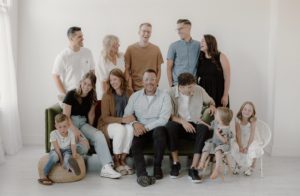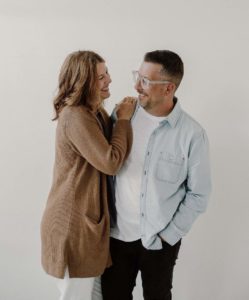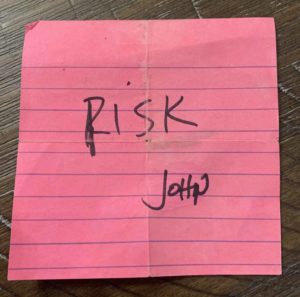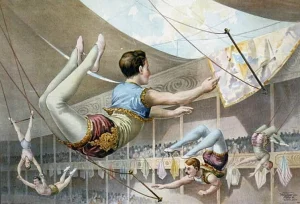The Gap Between the Two Trapezes
Last year I read 115 books, and the year before that I read 150. For a number of years now I have set really high goals of reading pretty much whatever I can get my hands on, and in large quantities. Fiction, non-fiction, children’s literature, journals, periodicals, manuals, cookbooks, and the like. Honestly, I’ve been known to linger at the breakfast table just to read the list of ingredients on the cereal box and almond milk carton. My kids used to mock me (ok, they still do), for how much I read.
 So, I have absolutely no problem consuming content.
So, I have absolutely no problem consuming content.
As well, if you were to pick up one of my recently read books (the ones I own of course, not loaner books), you would notice that it is chock-full of underlines, asterisks, circles, squiggly-marks, and other notes in the margins. In my opinion, reading without a pen in hand is like, well, not reading.
So, I have absolutely no problem interacting with content.
It’s at this point that a finished book will take its rightful and restful place upon my burgeoning shelves. And it is at this point I now am able to realize just how anemic I truly am at Analytical and Synoptical Reading(Alder and Van Soren). On the other hand, Elementary and Inspectional Reading come quite naturally to me. I can fly through a book quickly, often one-per-day, but if you were to ask me later what it was about or inquire about a key learning, I would look at you with furrowed brow and shrugged shoulders. I couldn’t tell you. Then again, I am the preacher that can wrap up multiple Sunday services and not remember later that same afternoon what I had just taught. My memory is horrible. I retain very little.
 My wife on the other hand, ah, she remembers everything…
My wife on the other hand, ah, she remembers everything…
Everything.
Alas, after digesting “How to Take Smart Notes” (Ahrens) I wonder if I have wasted thousands of hours reading and yet not properly retaining.
I would, if I could, like to go back many years and have a “reading do-over.”
OR, I can start right now.
“The best time to plant a tree was 20 years ago. The second best time is now.” – Chinese Proverb
In these formative months of my doctoral program, I am challenged by the need to read/think differently. Better. More critically. For retention and application. Subsequently, the challenge extends to that of my writing, even as Ahrens asserts that “Writing is not the outcome of thinking; it is the medium in which thinking takes place.”
Whereas, I have 30+ years of experience in writing sermons, devotions, blog posts, emails, leadership lessons and proposals, I believe this doctoral program will require of me (my reading, thinking and writing) a deeper response, one that flows from a deeper reservoir.
I welcome this challenge.
 Why? Because it’s what I prayed for.
Why? Because it’s what I prayed for.
This doctoral journey began with a word, a word the Lord God place upon my heart for the next season of my life. The word is “RISK.” It’s not the word I would have naturally gravitated to (thus the sense it was from Jesus). Now as I am in the 2nd half of my life (51 years old), I would have expected a word from the Lord such as “Peace,” “Rest,” or “Take it Easy, You’ve Worked Hard for Many Years, So It’s OK if you Coast the Rest of the Way.” Yah, I would have liked any of those.
But instead…RISK: Go deeper. Take a chance. Take even more chances. Lean in. Let go.
 I refer to this space as the “gap between the two trapezes.” It’s scary letting go of one swinging trapeze bar in order to secure the other. The gap between is where the risk is. But, that’s where I sense the Lord is calling me. Thus, I begin this graduate degree, and an extended season of deeper risk.
I refer to this space as the “gap between the two trapezes.” It’s scary letting go of one swinging trapeze bar in order to secure the other. The gap between is where the risk is. But, that’s where I sense the Lord is calling me. Thus, I begin this graduate degree, and an extended season of deeper risk.
A deeper response requires a deeper reservoir, which requires a deeper risk.
Here we go!
12 responses to “The Gap Between the Two Trapezes”
Leave a Reply
You must be logged in to post a comment.
I’m with you, John. It’s easy to think we’re the ‘old dogs’ who can’t learn new tricks, but if we keep taking risks, staying curious, inviting wonder and pursuing change I think (hope) that will keep us young. I’m also looking forward to growing in my critical engagement of reading and writing in the next couple of years… and also looking forward to getting a better answer when I ask you “what was that book you just read about?” 🙂
Who are you calling an “old dog?” 🙂
Your comment brings to mind the value of “accountability.” It’s so vital to have people in my life that are able to ask good, (and sometimes) hard questions. In order to deepen my critical engagement with reading, I invite the question “What was that book about?”
What might be a couple other valuable questions? For example: “How will you live differently because of what you’ve just read?” Can you think of others?
John, I connect with your comments. Especially, about being an avid reader but a lousy retainer. Both Adler and Sonke have given me a new perspective on both reading and note taking. My dilemma is choosing a digital program that meets might needs. I am looking at Obsidian for note taking. Your thoughts?…Shalom, Russ
Hello Russ, choosing a digital platform is important. There are too many good resources available to us today that it would be unfortunate to not utilize them. But I have found that I need to really focus and keep it simple. It’s just my opinion and preference: I appreciate the simplicity of “Notes” for Mac. I looked at Obsidian and it would take me a bit to get up to speed on it, and I’m sure it’s amazing, but I’m opting to keep with what I know I’m already comfortable with. I also use Evernote quite a bit in my life. Regardless, find what works for you! Perhaps you already are using it.
John – Inspiring to say the least! My NPO centers around ministry leaders facing mid-life seasons and how there is a need for a greater attentiveness and processing in preparation for upcoming greater contributions to the Kingdom. Steve Wiens in his book “Beginnings” states that we are often scared to leave the “endless drumbeat of the forced march of life” and so on we go, marching faithfully, exhausted. We are often “empty of beginnings, full of endings.” (p. xiv). Your obedience to “risk” in a season where you could coast will reap great dividends. Thank you for sharing.
Beginnings: The First Seven Days of the Rest of Your Life. Midwest Book Review, 2016.
Appreciate your comments Esther, and I sincerely look forward to what you put together regarding “mid-life seasons” – I’m right there!
John, thank you for discussing risk in your post. When I envision myself as an acrobat swinging and letting go (it’s not a pretty picture), it feels inevitable that I will just drop straight down. At least there is a safety net, right? I can only imagine (because there is no way I would try out a trapeze) there is momentum pushing me toward the bar I am trusting will be right where it is supposed to be, ready to grasp and carry me forward. I imagine it feels like flying and freedom. Where are you finding freedom “in the gap between the two trapezes”?
Jenny, I find it so interesting that even when I KNOW there is a NET, I’m still fearful. I still think I’m gonna die. This is all metaphorical, of course, because I’ve never done any trapeze work. However, I have done Zip Lines, and I did skydive ONCE (why would anyone jump out of a perfectly fine airplane???). In these, and other moments of risk I knew I would be OK, yet was fearful nonetheless.
You asked where I’m finding freedom in the GAP…I think it would be in being a new “empty-nester” and the joy of discovery for my wife and I. As well, I would add, the season I am in as a senior pastor of 30+ years. It’s a time in which I’m not sure what may be next after this long season, but I’m fearfully excited! Thanks for asking.
As a fellow 51-year old, I found your framing of this season of “risk” and the need for a “deeper reservoir” to be deeply challenging. The approach I’ve had to reading, writing (though I don’t think I’ve done nearly as much reading and writing as you, and I certainly do not enjoy preaching), and critical thinking, or lack there-of, is lacking. It is not going to equip me with the resources I need to serve those I am called to serve in this chapter of my life and career. I will always enjoy reading cereal boxes (especially Peanut Butter Captain Crunch), and I love to collect information, but the problems I’m solving today and tomorrow require greater understanding and a greater synthesis of ideas and concepts. Well done with this essay, John. Seriously.
Understanding and synthesis – you nailed it Travis. Those are my challenges!
I love the trapeze concept. I think that story is a perfect way to describe “risk”. What I like about that concept is that in order to get to the next trapeze you have to “let go”! Boy is that hard, to let go. Continuing to do what we know we can do is so much easier, especially when feeling overwhelmed or inadequate. Thank you John for talking about risk…with great risk comes great rewards…and sometime spectacular falls! May we all have discernment on what we need to let go of to get to the next trapeze!
Hey John! WOW! You and I are so much alike. Please don’t feel insulted by that statement because there is no way I am placing myself on your level! But we both love to read immensely and mark up our books and struggle to remember what we read! 😊
What really stood out to me was your comment, “I believe this doctoral program will require of me (my reading, thinking and writing) a deeper response, one that flows from a deeper reservoir.” Once again, that’s where I am and you helped me to put words to what I was feeling and thinking. Thank you, sir! I strongly believe we have an excellent co-hort that will help us achieve this! Let’s do this, bro!